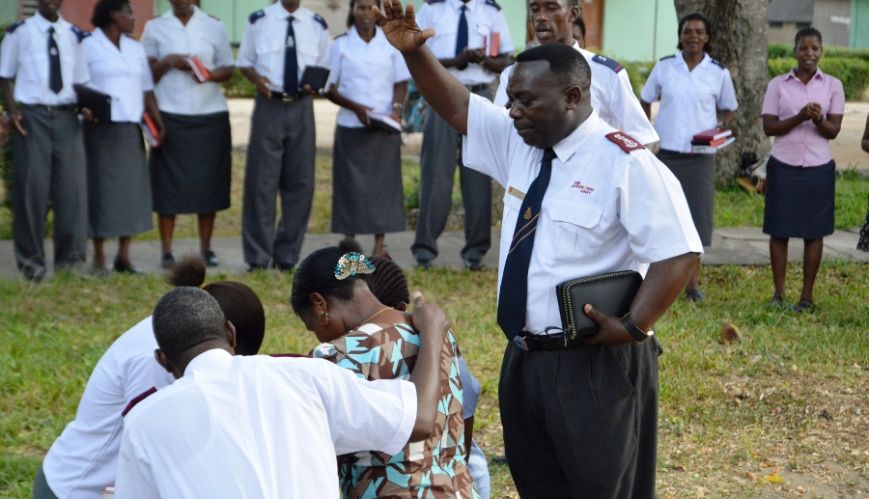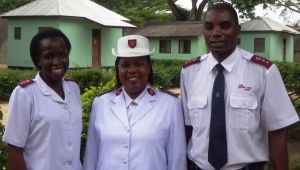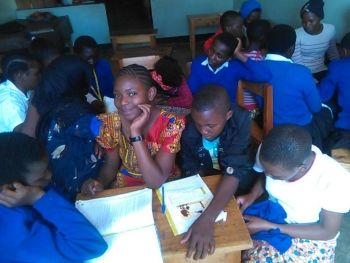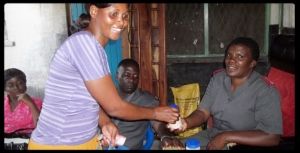Tanzania Territory - Laying a strong foundation for growth

Tanzania Territory - Laying a strong foundation for growth
20 July 2018
Tanzania has reminded us of the amazing levels of resilience that human beings can possess, of the importance of friendship and of fellowship first, and of perseverance to ensure that we truly put the needs of others first, particularly those that are most vulnerable.
In 1950, at the request for assistance from the Colonial Governor, The Salvation Army set up Mgulani Camp to assist homeless and unemployed immigrants. This is now the site of Tanzania Territorial Headquarters.
The Salvation Army was registered in Dar es Salaam (the country’s former capital) in 1961. Tanzania became a separate Salvation Army command on 1 October 1998, and was elevated to territory status on 1 February 2008.
During 2017, the culmination of a capital development initiative enabled renovations to be made to the Mgulani Hostel and Conference Centre and the opening of the new territorial headquarters.
In addition, the territory commissioned 17 new lieutenants and conducted a territory-wide officers’ councils. Commissioners Benjamin and Grace Mnyampi, International Secretary and Secretary for Women’s Ministries, Africa, led this historic weekend.
Communities that border Lake Victoria have experienced growth and development. With support from the USA Central’s 20 New Corps initiative, the expansion has laid a strong foundation for continued ministry in this previously unreached area of the country. 
Nearly 7000 people attended the territorial women’s meeting when Lieut-Colonel Mary Mkami, Territorial Secretary for Women’s Ministries, was the guest speaker. Her powerful message not only touched hearts but also provided a platform for the Army to be visible as a strong and vital part of the Evangelical Church in the country.
community focus
New community programs were also a point of focus for the territory.
Women’s Ministries began an extensive initiative of community mobilisation and awareness of the need to combat domestic violence, specifically Female Genital Mutilation. Although the territory is new to the fight, there have been amazing stories of young girls standing up for themselves, protesting in the community, and refusing to be violated.
In this battle, the territory stands firmly on the foundation of righteousness and justice as it partners with other churches, international agencies and the community.
education impact
The territory operates two schools that provide centres of excellence in learning, critical thinking and Christian formation for almost 200 children.
The Matumaini centre is a residential primary school for children with disabilities, and children with albinism.

In addition to education, the school provides physical therapy and operates a workshop to manufacture and repair walking appliances and wheelchairs. Located on 160 hectares of rolling grasslands in the highlands of Ilemo, the Itundu secondary school provides education for local communities and boarding facilities for those outside the area.
The school, with almost 300 students, recently began practical training in farming and forestry in partnership with agricultural and forestry organisations.
Interview with Australia’s Salvation Army International Development team about its projects in Tanzania.
What projects do we have in Tanzania?
There are two active projects in Tanzania: 1. The Tanzania Education and Psychosocial Care and Support Program for Most Vulnerable Children (Recovery Centre); 2. A program empowering vulnerable and marginalised women through a village savings and loans association.
How are these projects building sustainability, improved lives, capacity, and hope, in Tanzania?
1. Since the early 1990s, Tanzania has been witnessing an increasing rate of human trafficking. As a response, this recovery centre project focuses on girls between the ages of 7-18 years old, who have been trafficked, or are at risk of being trafficked. Through the support, counselling, education and life skills training that is offered, these young girls are able to be rehabilitated in the hope that they are able to go on to have meaningful futures that facilitate the realisation of their full potential.
To assist with the breaking of the human trafficking cycle, this project also works to educate the villages and communities where these girls come from, to stop the continued flow of trafficked girls in and out of Dar Es Salaam (Tanzania’s most populous city), and to reinforce both the local and national government protection apparatus though increased engagement in the fight against human trafficking. 
2. Poverty is a major social and economic challenge faced by a vast proportion of the female Tanzanian population. Women struggle to send their children to school, to meet much-needed medical expenses, and to provide adequate nutritious meals for their families. To date, we have seen women increase their ability to invest in better familial nutrition, improve their living conditions, educate their children, provide adequate medical care, meet basic household needs, and also be empowered to make decisions independent of their husbands.
What is Australia learning from its relationship with Tanzania – culturally, spiritually or in any other way?
Australia and Tanzania are Partners in Mission, meaning that we have been linked to support each other both financially and in ministry, working together to strengthen one another in all that we do.
Through this meaningful relationship, we share resources, stories, prayers, knowledge and much more. Tanzania has reminded us of the amazing levels of resilience that human beings can possess, of the importance of friendship and of fellowship first, and of perseverance to ensure that we truly put the needs of others first, particularly those that are most vulnerable.
How do you see the relationship with Tanzania going forward?
Australia’s relationship with Tanzania is focused on the future. Together we will continue to grow as partners, supporting each other wherever possible.